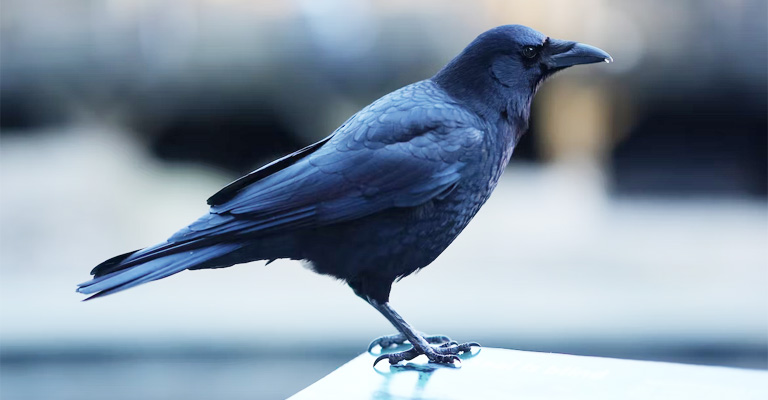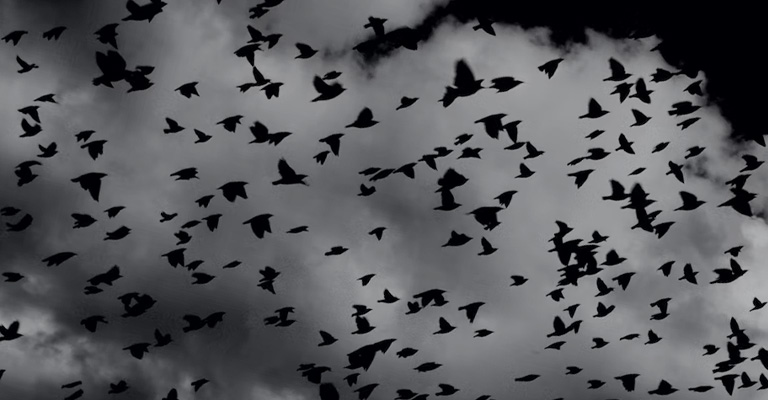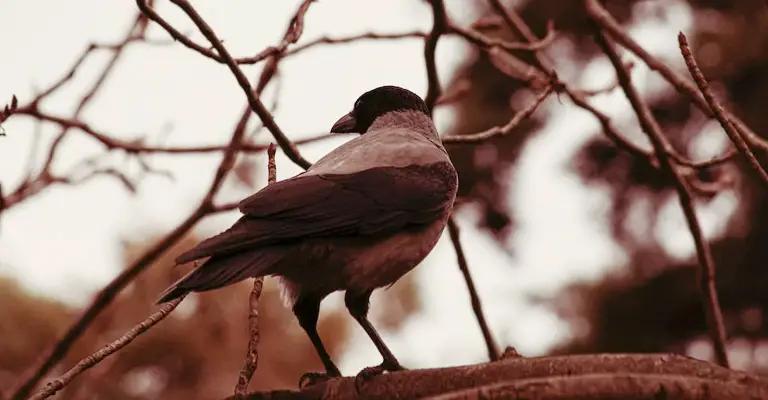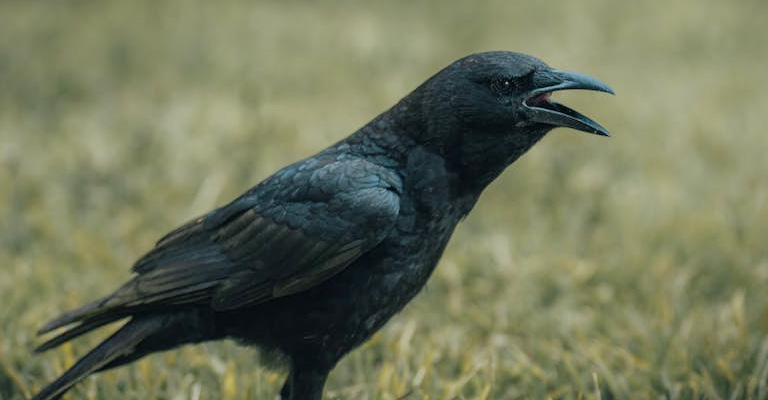Crows are fascinating creatures that have captured the attention and curiosity of humans for centuries. Known for their intelligence, adaptability, and distinctive cawing, crows are found in various parts of the world and have become a common sight in urban and rural environments alike.
One question that often arises when discussing crows is whether are crows nocturnal. do crows fly at night? In this article, we will explore the behavior and habits of crows to determine if they are truly nocturnal and shed light on their flying patterns during the night.

Are Crows Nocturnal? Do Crows Fly at Night?
To understand whether crows are nocturnal, it is essential to first define what it means for an animal to be nocturnal. Nocturnal animals are those that are primarily active during the night and rest or sleep during the day.
They have adapted their senses and behaviors to function optimally in low-light conditions. Nocturnal animals often have enhanced night vision, acute hearing, and specialized adaptations to navigate and hunt in the dark.
Crows and Diurnal Behavior
Contrary to popular belief, crows are not strictly nocturnal creatures. In fact, they are primarily diurnal, meaning they are active during the day. Crows are known to be early risers, often starting their activities at dawn and continuing until dusk.
During the day, crows engage in various behaviors such as foraging for food, socializing, building nests, and defending their territories.
However, it is important to note that crows do exhibit some crepuscular behavior, which means they are active during the twilight hours of dawn and dusk.
During these times, crows may be seen flying in large groups, known as a “murder,” as they move between their roosting sites and foraging areas.
This behavior is more pronounced during certain seasons, such as autumn and winter, when crows gather in larger numbers for communal roosting.
Crows and Nighttime Activity
While crows are primarily diurnal, they do not completely cease their activities once darkness falls. Crows are known to be opportunistic feeders, and if there is a readily available food source, they may continue foraging into the night.
This behavior is more common in urban areas where artificial lighting can attract insects and other small prey, providing a nocturnal food source for crows.
Additionally, crows may engage in some nighttime activities related to their roosting behavior. Crows typically roost in large trees or wooded areas, often in groups that can number in the thousands.
Do Diurnal Crows Fly at Night?

While diurnal crows are primarily active during the day, there are instances when they may fly at night. However, their nighttime flight patterns are generally less frequent and more limited compared to their daytime activities. Here are a few reasons why diurnal crows may fly at night:
Communal Roosting
Crows often gather in large groups for communal roosting, especially during certain seasons like autumn and winter. As the day comes to an end, crows may engage in twilight flights, moving between their foraging areas and roosting sites. These flights can extend into the night, as they navigate to their chosen roosting location.
Nocturnal Foraging
While crows are primarily diurnal foragers, they are opportunistic and may continue to search for food into the night if there is a readily available food source.
In urban areas with artificial lighting, insects and other small prey may be attracted, providing a nocturnal food source for crows. They may fly at night to access these food sources.
Nesting and Reproductive Activities
During the breeding season, crows may engage in nesting and reproductive activities that require their attention even during the night.
This can include building or repairing nests, incubating eggs, or caring for young chicks. These activities may necessitate flights at night to gather nesting materials or provide food for their young.
Migration
While crows are not known for long-distance migrations like some bird species, they may undertake shorter movements during the night. These movements can be related to finding suitable roosting sites or accessing food sources.
It is important to note that while crows may fly at night, their flight patterns are generally less frequent and more purposeful compared to their daytime flights.
They rely on their excellent night vision and acute hearing to navigate and locate their intended targets.
Where Do Crows Go to Sleep at Night?

Crows have specific roosting sites where they go to sleep at night. These roosting sites are typically located in large trees or wooded areas, providing them with shelter and protection during the night. Here are some common types of roosting sites for crows:
Forests and Woodlands
Crows often choose forests and woodlands as their preferred roosting sites. These areas provide ample tree cover and a suitable habitat for crows to rest and sleep. They may select tall trees with dense foliage, which offer protection from predators and the elements.
Urban Areas
Crows have adapted well to urban environments and can be found roosting in cities and towns. In urban areas, crows may choose tall trees in parks, gardens, or even along streets as their roosting sites. They may also utilize tall buildings or structures with suitable perching spots.
Agricultural Fields
Crows are known to roost in agricultural fields, especially during the winter months. Fields with crops such as corn or wheat provide crows with ample food sources, and they may choose nearby trees or wooded areas as their roosting sites.
Coastal Areas
In coastal regions, crows may roost near shorelines or estuaries. They may select trees or cliffs along the coast as their roosting sites. These areas provide them with access to food sources such as marine invertebrates or carrion.
Communal Roosts
Crows often gather in large numbers for communal roosting, especially during the colder months. These roosts can be quite impressive, with thousands of crows gathering together. Communal roosts are typically located in areas with suitable trees or wooded habitats that can accommodate a large number of birds.
It is important to note that the specific roosting sites can vary depending on the region, availability of suitable habitat, and the local population of crows. Roosting sites may change over time as crows adapt to their surroundings and environmental conditions.
Why Crows Make Noise at Night?

Crows are known for their distinctive vocalizations, and they may make noise at night for various reasons. Here are some possible explanations for why crows make noise during nighttime:
Communication
Crows are highly social birds and use vocalizations as a means of communication. At night, crows may continue to communicate with each other through calls and cawing. These vocalizations can serve multiple purposes, such as maintaining contact with other members of their group, signaling danger or potential threats.
Territory Defense
Crows are territorial birds and may use vocalizations to defend their territory, even at night. They may engage in territorial displays and vocalize to assert their presence and deter potential intruders. These vocalizations can serve as a warning to other crows or animals that they are defending their territory.
Alarm Calls
Crows have a sophisticated alarm system and are known to emit loud, harsh calls when they perceive a threat. At night, crows may be more vigilant and sensitive to potential dangers, such as predators or disturbances. If they detect something that triggers their alarm, they may vocalize loudly to alert other crows and warn them of the potential threat.
Roosting Communication
Before settling down for the night in their communal roosts, crows may engage in social interactions and vocalizations.
These vocalizations can serve as a way to establish social bonds, reinforce group cohesion, or communicate information about suitable roosting sites or food sources.
Environmental Factors
Certain environmental factors, such as bright lights or loud noises, can disrupt the natural sleep patterns of crows. If they are exposed to these stimuli at night, they may become more active and vocalize in response to the disturbance.
Why Are Crows Sometimes Awake at Night?
Crows are primarily diurnal creatures, meaning they are most active during the day. However, there are instances when crows may be awake and active at night. Here are a few reasons why crows may be awake at night:
Nocturnal Food Sources
Crows are opportunistic feeders and will take advantage of available food sources. In urban areas, artificial lighting can attract insects and other small prey, providing a nocturnal food source for crows. They may continue foraging into the night if there is an abundance of food.
Communal Roosting
Crows often gather in large groups for communal roosting, especially during certain seasons like autumn and winter. Before settling down for the night, crows may engage in social interactions, vocalizations, and territorial displays. These activities can sometimes extend into the night.
Nesting and Reproductive Activities
During the breeding season, crows may engage in nesting and reproductive activities that require their attention even during the night. This can include building or repairing nests, incubating eggs, or caring for young chicks. These activities may keep them awake and active at night.
Environmental Factors
Certain environmental factors can disrupt the normal sleep patterns of crows. For example, loud noises, disturbances, or changes in their habitat can cause crows to be awake and alert at night. They may be more vigilant and active during these times to ensure their safety and the security of their territory.
Artificial Lighting
In urban areas with extensive artificial lighting, crows may be influenced by the altered day-night cycle. Bright lights can confuse their internal clocks and disrupt their natural sleep patterns. This can result in crows being awake and active at night, especially in areas with constant illumination.
FAQs
No, crows are not completely inactive during the night. While they are primarily diurnal creatures, they may continue their activities into the twilight hours of dawn and dusk. Additionally, if there is a readily available food source, crows may forage into the night.
Yes, crows have excellent night vision. They have adapted to low-light conditions and possess specialized adaptations that allow them to see well in the dark. This enhanced night vision helps them navigate and locate food sources during the night.
Crows gather in large groups, known as a “murder,” at dusk for communal roosting. Roosting in large numbers provides safety in numbers and allows them to share information about food sources and potential threats. It also helps them conserve body heat during colder seasons.
While crows are not known for long-distance migrations like some bird species, they may undertake shorter movements during the night. These movements are often related to finding suitable roosting sites or accessing food sources
Crows have a few natural predators, but they are not specifically targeted at night. Predators such as owls, hawks, and raccoons may pose a threat to crows both during the day and at night. However, crows are highly intelligent and have developed various strategies to avoid predation.
Bottom Line
That was all about are crows nocturnal – do crows fly at night? While crows are primarily diurnal creatures, they do exhibit some crepuscular and nocturnal behaviors.
Crows are most active during the day, engaging in various activities such as foraging, socializing, and defending their territories.
However, they may also be seen flying during the twilight hours of dawn and dusk, especially during certain seasons when communal roosting is more prevalent. Additionally, crows may continue foraging into the night if there is a readily available food source.
Their flight patterns at night are generally less frequent and more purposeful, directed towards roosting sites or nocturnal food sources.
Overall, crows’ behavior and flying patterns demonstrate their adaptability and ability to thrive in various environments, both during the day and at night.